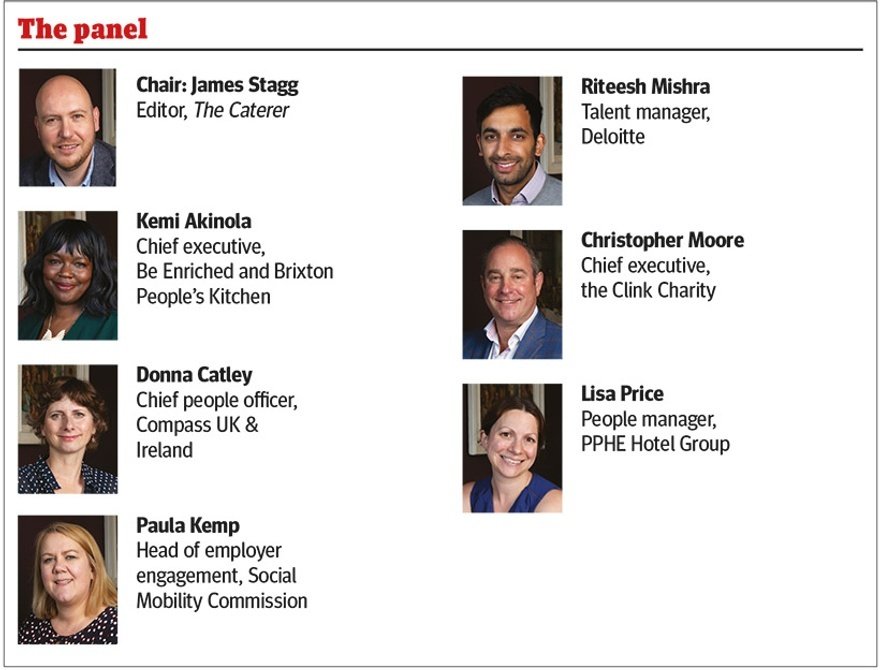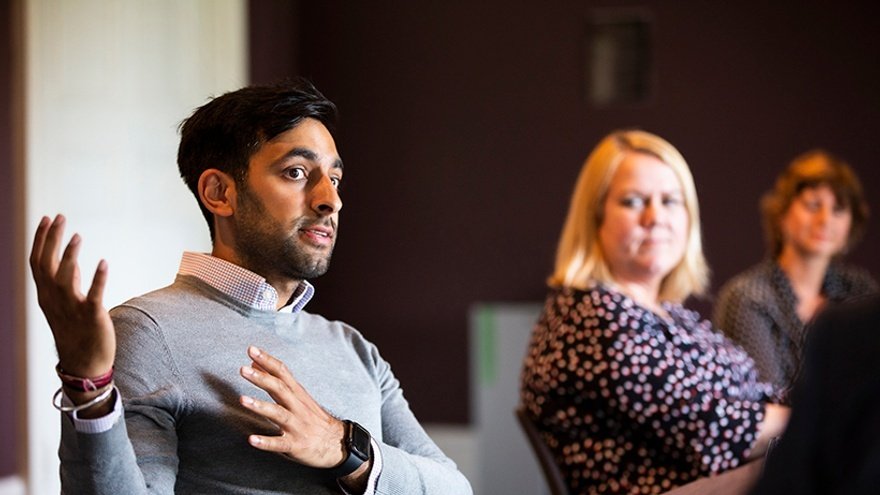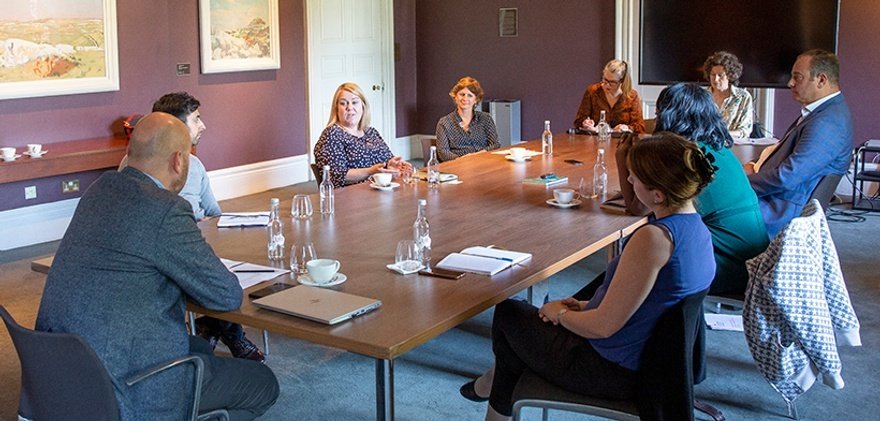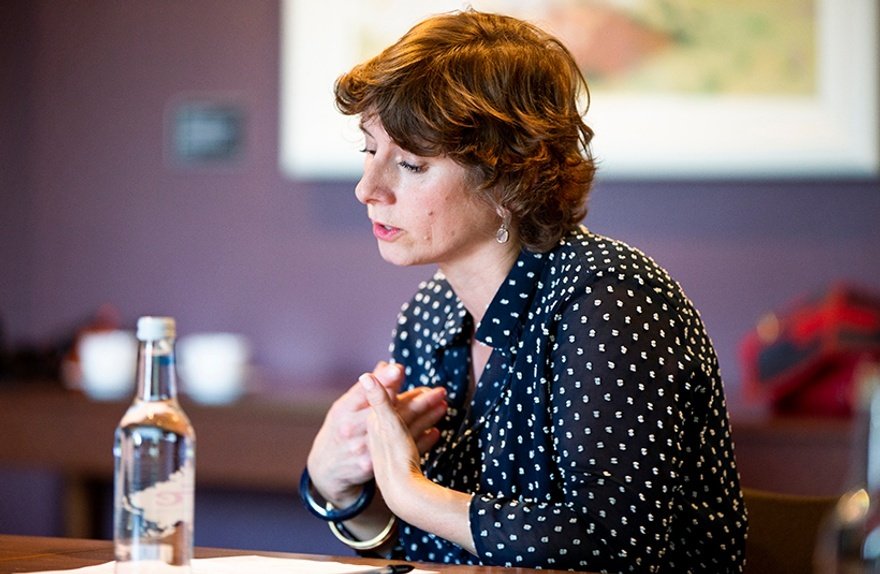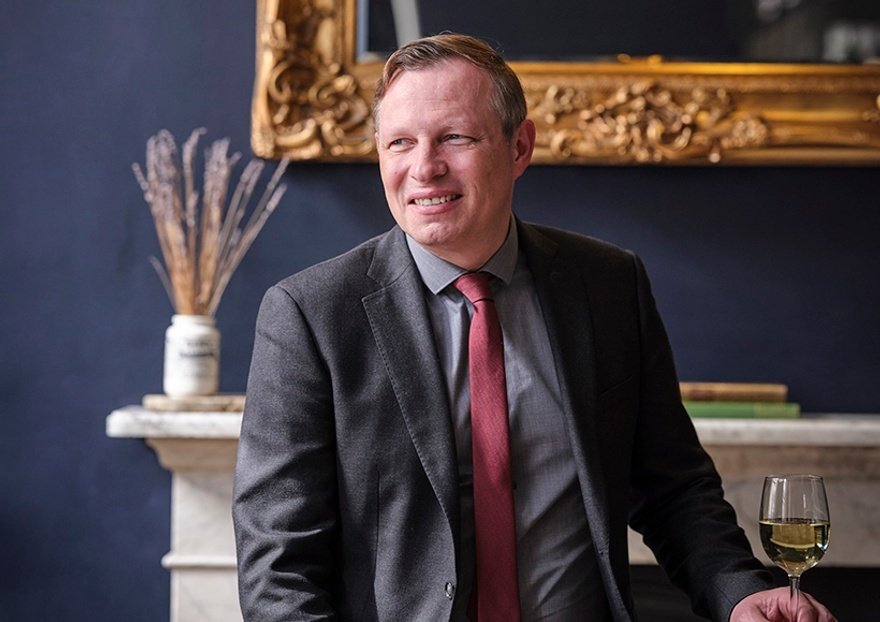Businesses that facilitate social mobility are not only doing the right thing, they are also tapping into a rich resource to beat the latest skills shortage. This was the conclusion of a group of forward-thinkers who gathered for a socially distanced discussion at the Imperial War Museum in London, hosted by The Caterer in partnership with Compass Group UK & Ireland. Rosalind Mullen reports.
Many of you here today have signed the social mobility pledge, and although you are from diverse businesses there are common issues. What does the pledge mean to you?
Paula Kemp (PK): The Social Mobility Commission is separate to the pledge, but similarly wants to put an end to how a person's start in life influences their outcomes. We monitor social mobility in the UK and work with education, policymakers and employers to promote it.
Donna Catley (DC): At Compass we put social mobility and equality at the heart of the group, but we are in a unique position. We have 45,000 jobs across 6,000 sites and we reach into all areas of the country, not just affluent areas.
We are also barrierless to entry. You don't need a PhD or a Russell Group degree. You can start on the first rung and we will offer you the skills and support to progress. We work in partnership with government bodies and charities to deliver this and to effect change in society.
Deloitte is a global professional services company. Is it difficult to get people from different backgrounds to approach such a blue-chip brand?
Riteesh Mishra (RM): We employ 22,000 people in the UK and we used to typically recruit people with similar educational backgrounds from the same universities. We've worked hard to break down those barriers by engaging with different universities and schools, and we work with charities and organisations to make it as accessible as possible. We have an ‘attraction team' dedicated to this work, so we have weight behind it. It's about finding that balance of not excluding. We need to tackle social mobility from the bottom up and we're proud of the work we've done at the junior level to create opportunities.
Be Enriched and Brixton People's Kitchen provide work experience for young offenders, vulnerable young people or those with learning difficulties. How easy is it to engage people?
Kemi Akinola (KA): You would think that people would want to work, but they don't always turn up to interviews. It's also challenging to get people to come in and do their job, but maybe they don't see hospitality as a career. I think culinary skills should be taught in schools so people can see it as a potential career.
The Clink trains prisoners to be ready for hospitality work when they are released, but is there demand for their skills?
Christopher Moore (CM): Yes, demand is great at the moment. Our students on the programme are work-ready. They are used to getting out of bed and taking pride in their work. They've been growing in confidence and learning to work as a team. If I had twice as many candidates, I could place them all.
With the current surge in hospitality vacancies due to Covid and Brexit, it seems like a good time to work hard on facilitating social mobility.
Lisa Price (LP): Yes, the growth in vacancies has reinforced our work to recruit people closer to home. Our hotels in Lambeth work with local charity Oasis to get local people into employment. We try to remove the barrier to entry because a lot of entry-level roles don't need experience – you just need attitude, and we can train for that.
A lot of entry-level roles don't need experience – you just need attitude, and we can train for that.
Is the concept of social mobility difficult to sell to hospitality operators?
LP: Historically there was a wider talent pool, so employers would take the perceived easier option and think that if someone already had experience of working in a bar, they didn't have to train them. It's true that extra support needs to be given to those from disadvantaged backgrounds. But during Covid, many workers returned to their home countries, so managers need to shift their mindset and consider candidates they may have overlooked in the past. We need to educate managers to think about who else is out there.
Is it as simple as getting people into the junior roles?
DC: It's not just about first-rung jobs; it's about big organisations being able to evidence that you can start on the first rung and then progress as far as you want to go. If we can't show that staff at all levels, right up to senior managers, have come from diverse backgrounds, then we haven't done a good job. We need to be open to all every step of the way, not just at the bottom. That is a challenge Compass is taking on. It is about creating meritocracy and transparency of progression.
RM: People need to see that those in the decision-making roles look like them. We have done work around inclusivity at the attraction and recruitment stage. There is a big debate on the effectiveness of unconscious bias training as it can go the other way, so we focus on inclusivity training to understand other people.
PK: When employers are looking at who to appoint to the stretch or accelerator roles, they need to ensure that the whole team gets access, not just people who ‘look' like them.
How easy is it to get leaders to talk about their pathway to demonstrate that you have social mobility throughout the business?
RM: This is tricky, and getting managers to talk about their socio-economic background is trickier.
DC: Yes. We asked our top 300 managers in the UK about their background using key questions, such as what their parents' jobs were, what their education was like and so on. People found it too personal and uncomfortable, so you have to give an explanation as to why you are asking those questions. When you are armed with data you can understand the make-up of your executive team and start to celebrate people.
We have a campaign called #nolimits to promote the fact there are no limits to your career. It shares stories about how people have grown with Compass – for example, they may have started aged 16 in the kitchen and progressed to being an operations director. That is a brilliant example of how you can progress, and celebrating success stories is important.
KA: I work with young people, so I have to have boundaries about sharing information to safeguard them and myself. I share some information to build rapport, but I am guarded because I need them to respect me so that they do the job well.
LP: We employed homeless people and wanted to celebrate their success, but they didn't want to be seen as the "special case". So, we do this really good work, but we have to do it in secret.
PK: Yes, some apprentices don't want to be singled out, so we celebrate all apprentices from all backgrounds. This ultimately represents a truly diverse organisation, rather than just offering up one or two role models.
KA: It is about their pride and not wanting to be seen as a charity case.
CM: We don't want our students to feel ashamed of their past, but we give them a disclosure letter to share with their employer. It comes out in conversation with their colleagues eventually, but by then they are one of the team. It is about their identity now rather than the mistakes of the past.
How do you provide these candidates with the right conditions to progress once they have joined your business?
LP: It depends on the individual, but work may be needed around their employability. This is around helping them understand the importance of getting to work on time and getting them through the first months. Bear in mind their household maybe isn't going out to work, so some handholding will be needed. And if you've never worked before, being out of the house for 10 hours a day requires a transition period. You need managers who spend time with them, show patience and boost their confidence.
DC: So much comes down to the managers. If someone has never worked, or if they are at a later stage in life, or have had time off for children, it is their manager who gives them support and confidence.
CM: We shouldn't label people on their past, we should embrace people for their future. Building confidence is important. We employ support workers to deliver our students to work because [prisoners] who have been locked up are often scared to go out.
We shouldn't label people on their past, we should embrace people for their future
RM: Often it's those who shout loudest who get the opportunities to develop. You do find that those from a minority background often don't have that personality trait and they require someone to advocate for them.
KA: And some people don't want to progress, so you need to also support them.
LP: Yes. We adapted our appraisal process so that it is not assumed that employees want to progress. Instead, we focus on performance.
Could you tell us about the pathways programme at Compass?
DC: A central premise is that there are no dead-end jobs in our business. Every job is an opportunity to get confidence and learn skills. We did a lot of work over the past 18 months to compile information on how to grow your career in six of the main disciplines – front of house, culinary and so on. We've created career pathways, listing the jobs that are available at each stage, what skills you need and what you need to do to move up the ladder – if that is what you want. We did it because we got feedback from people saying, ‘we love it here, but we don't know how to get on'. It puts destiny in the worker's hands, not the manager's.
How do you measure your progress in facilitating social mobility?
DC: We will use our employee survey later this year to create a baseline so we can understand the socio-economic background of our people, whether they are progressing and if they are from a spread of socio-economic backgrounds. And we are working with organisations about how we do that, as not a lot of employers have done this work yet.
PK: The national benchmark is that 39% of the population have a working class background and so companies should be seeing that at every level, too.
There are lots of examples of people who have gone from potwash to chief executive, but these stories seem to be mainly middle-aged white men.
LP: In hotels, the operations manager level is where you see middle-aged white men being predominant. Other backgrounds get to a certain point and don't get any further. That is where we need to do our work.
PK: We need to recognise where there is a double disadvantage [a woman from a disadvantaged background could be hindered by both class and gender].
How can you sell a social mobility strategy to the board?
DC: At Compass, senior leaders get it, mainly because of their own stories. It has been more about articulating the strategy.
LP: The board ‘get it', but often they don't know where to start. It's not just about doing the right thing. The recruitment market has changed in the past 18 months, so it is necessary to tap into different markets – it's not just ‘nice to have'.
DC: We are in a sweet spot for change. There is no better catalyst than when it makes great commercial sense and it is also the right thing to do.
There is no better catalyst than when it makes great commercial sense and it is also the right thing to do.
PK: Everyone here today is sharing their diversity and inclusion initiatives, so I think it is on the agendas of more businesses. We offer employer toolkits and industry-specific ones. You need to start somewhere – so start small.
So, where is the starting point?
KA: Organisations like ours and the Clink are a gateway to recruitment. I only recruit from excluded people, so it is hard for me to understand why you need a strategy and why people were excluded from the industry in the first place.
CM: The people are out there, but they are not being tapped into. I know of one hotel group that has recruited employees from the local estates, but the recruits had nutritional problems and timekeeping issues, so they brought their families in to give them cooking lessons and show them where their family members work.
LP: Through our work with the Oasis charity, we take them around different departments to get a feel. Hotels have such a range of jobs, and it is about making that known.
CM: Some 55,000 people a year come out of prison. We help our graduates in their first year to reintroduce them to society. Some 25% don't have anywhere to live, so they can't get a bank account and therefore can't get a job, but if you sort that out for them, you have an incredible workforce.
My route to the top: Shaun Fitzgibbon, business director, Restaurant Associates
Shaun Fitzgibbon had always been ambitious and hardworking, having started work aged 12 in kitchens at the weekends. He dreamed of being a chef and started catering college at 16, passing his City & Guilds in hospitality and catering. Little did he know that 35 years later he would be one of the top 200 leaders in Compass Group UK & Ireland, rising through the ranks of management in just 16 years.
After a 15-year stint cheffing, five of those with Compass, Fitzgibbon embarked on a career the other side of the pass, taking a job as foodservices manager in 2004.
He impressed and a year later was made general manager, responsible for the catering operation at a blue-chip investment bank.
It wasn't until the opportunity opened up for him that he found that he could add value in a management role. Compass helped Fitzgibbon with the necessary training he needed moving up the management ladder and in 2007 he became operations performance manager, responsible for mobilisations and projects across Restaurant Associates.
Having taken on the role of head of operations, the high flyer moved into an account director position and then back to multi-operations. He was made operations director and part of the RA leadership team in 2015. The next four years saw Fitzgibbon excel in leadership, inspire his team and work closely with clients, gaining their trust and respect. This brought the natural progression and accolade of leading Restaurant Associates as business director in 2019.


